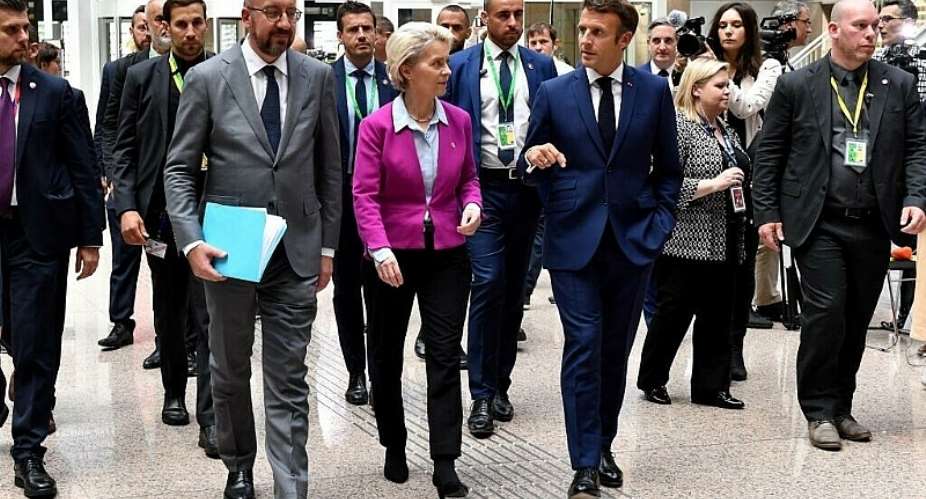On 1 July France passed the baton of the EU presidency to the Czech Republic. The rotating presidency involves setting the European Union's agenda for a period of six months, with all 27 EU member states holding that position once every thirteen and a half years.
The last time France headed the EU Presidency was in 2008 and preparations for the 2022 turn at the helm started three years ago under the government of former Prime Minister Edouard Philippe, who reserved a €140million budget to deal with special occasions related to the presidency.
In the end, France organised some 400 events, crowned by the EU Versailles summit at the beginning of March.
The French presidency of the European Union encountered two major hurdles: the war in Ukraine, and presidential and legislative elections in France itself.
When France took over the rotating presidency of the bloc on 1 January, Russia was already amassing tens of thousands of troops along its border with Ukraine.
In a speech to the European Parliament, Macron stressed that he would try to “find a political solution” for the conflict in Ukraine, which “remains the source of current tension,” calling on other EU states for support.
When Russia finally invaded Ukraine on 24 February, the European Union unleashed a series of sanctions on Moscow, with even Hungary – the most pro-Putin EU member state – participating, albeit reluctantly.
Macron tried to walk a fine line between more belligerent NATO allies like the US and the UK, by keeping the door open to dialogue with President Putin, even though lengthy discussions didn't lead to any breakthrough.
France also kept on pushing for a more independent European fighting force, but that idea was largely overshadowed by increased unity within NATO as a direct result of the war in Ukraine, that was on open display during a summit at the end of June.
But Macron's idea of a European army as a “complement” to NATO was only strengthened as a result of the Russian invasion.
The French president also had to deal with a new leadership in Germany and managed to maintain the Franco-German partnership which lies at the heart of the Union.
For over a decade, European leadership was guided by German Chancellor Angela Merkel, but since the politically weaker Olaf Scholz took office in Berlin, EU member states have looked to Paris for direction – and the EU presidency offered a timely platform.
On top of that – since Brexit – France is the only EU country that has nuclear arms and possesses a fighting army that is considerably stronger than any other EU member state.
French elections
However, the French political landscape was not ideal for holding the EU presidency.
In April and June, the country held its five-yearly presidential and legislative elections respectively and Macron comfortably beat his opponent on the extreme right, Marine Le Pen.
While his newly rebranded Renaissance party and the "Ensemble" coalition of centrists remain the largest grouping in the National Assembly, Macron lost his absolute majority.
The political compromises, coalition building and dealing with a hostile and vocal opposition generated by this didn't affect France's presidency, as the six months have passed and the Czech Republic has taken over.
Eurosceptic Czechs?
But the Czech turn at the EU presidency is unlikely to be an easy ride.
According to Pavel Havlicek from the Prague-based Association for International Affairs: "This presidency is not geared for good weather, but for bad times."
The Central European country of 10.5 million people, an EU-member since 2004, has vowed to focus largely on aid to Ukraine and the war's repercussions.
Prague wants to contain the refugee crisis, launch a post-war reconstruction effort, boost the EU's energy security, defence capacities and economic resilience, and bolster its own democratic institutions.
But generally, Czechs tend to be eurosceptic.
A survey conducted by the STEM polling agency showed around 38 percent of them were happy with the EU.
The current centre-right government is less eurosceptic than some of its predecessors, but analysts have questioned its ability to distance itself from EU troublemakers Hungary and Poland.
(With agencies)





 SSNIT must be managed without gov’t interference – Austin Gamey
SSNIT must be managed without gov’t interference – Austin Gamey
 Ejisu by-election could go either way between NPP and independent candidate — Gl...
Ejisu by-election could go either way between NPP and independent candidate — Gl...
 We never asked ministers, DCEs to bring NPP apparatchiks for returning officer r...
We never asked ministers, DCEs to bring NPP apparatchiks for returning officer r...
 No one denigrated the commission when you appointed NDC sympathizers during your...
No one denigrated the commission when you appointed NDC sympathizers during your...
 Used cloth dealers protests over delayed Kumasi Central Market project
Used cloth dealers protests over delayed Kumasi Central Market project
 A/R: Kwadaso onion market traders refuse to relocate to new site
A/R: Kwadaso onion market traders refuse to relocate to new site
 Dumsor: Corn mill operators at Kaneshie market face financial crisis
Dumsor: Corn mill operators at Kaneshie market face financial crisis
 Jamestown fishermen seek support over destruction of canoes by Tuesday's heavy d...
Jamestown fishermen seek support over destruction of canoes by Tuesday's heavy d...
 Election 2024: EC to commence voter registration exercise on May 7
Election 2024: EC to commence voter registration exercise on May 7
 Public schools rebranding: We’re switching to blue and white, we’re painting all...
Public schools rebranding: We’re switching to blue and white, we’re painting all...
